The Metaverse Perception for Hong Kong
The term Metaverse has been around since 1992, when it was first mentioned in the science fiction novel "Snow Crash", as a portmanteau of “meta” and “universe”1. A more recent visualisation of a possible hyperreality “Metaverse” came out of a research-by-design project by Keiichi Matsuda in 20162 - where virtual information is overlayed onto the real-world world environment blending the boundaries.
Today, experts may also refer to a depiction of the Metaverse in a 2018 American science fiction action film directed by Steven Spielberg, based on Ernest Cline's novel of the same name – "Ready Player One". In “Ready Player One”, a seamless virtual world that links multiple environments seamlessly, and the experience is enhanced via virtual reality headsets and related gears. However, it was not until late 2021 when the term ‘Metaverse’ became mainstream and drove much hype when Facebook rebranded itself as Meta in October 2021 to showcase its ambitions to be a key player in the Metaverse.
Some described the decentralised Metaverse as an inevitable evolution of the Internet. Some imagined it as a virtual world where billions of people live, work, shop, learn and interact with each other -- all from the comfort of their couches in the physical world. The Metaverse has been built on years of research on artificial intelligence and immersive interactivity, and it will transform businesses in many ways.
Many predict the rapid adoption and growth of the Metaverse and related concepts. According to various estimates, the global Metaverse market size could reach anywhere from $3 to $5 trillion by 2030.
Hype and promises aside, what is the current state of awareness, knowledge, and perception of Hong Kongers of the Metaverse? How could brands engage Hong Kong consumers in the Metaverse?
THE METAVERSE AWARENESS
High awareness of the Metaverse in Hong Kong
The awarenesses of the Metaverse, and related technology concepts, such as cryptocurrencies and mixed reality (XR) are very high in Hong Kong. Around 4 in 5 Hong Kongers are aware of these technology concepts. However, only about 62% of Hong Kongers are aware of the NFTs.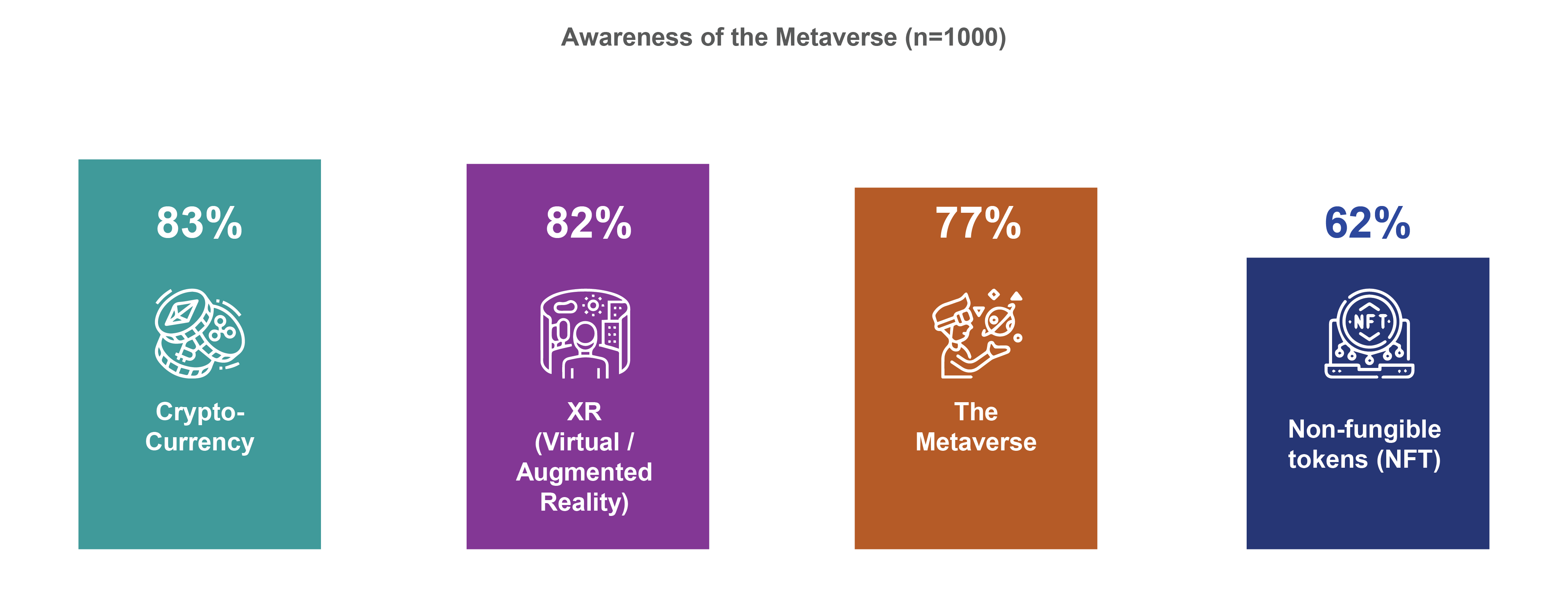
- There are minimal gender differences, with both about 4 in 5 of each gender aware of the Metaverse
- The awareness amongst age groups is generally high at 73% or above, but those between 16 to 39 years old are more likely to be aware of the Metaverse (~80%)
Extensive marketing drove knowledge of the Metaverse in Hong Kong
Extensive marketing and media attention on local Metaverse events/experiences have significantly increased the level of knowledge of the Metaverse for Hong Kongers.
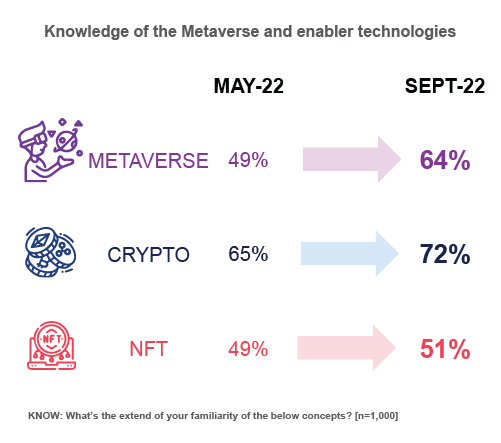
- The knowledge of the Metaverse has significantly increased over the past four months, from 49% in May 2022 to 64% in Sept 2022.
- Hong Kongers already have high knowledge of cryptocurrencies (65% in May 2022), which has increased to ~72% by Sept 2022.
- NFT is another fundamental Metaverse concept, enabling digital assets' ownership, transfer, and trading. The knowledge of NFT has only slightly increased from 49% in May 2022 to 51% in Sept 2022.
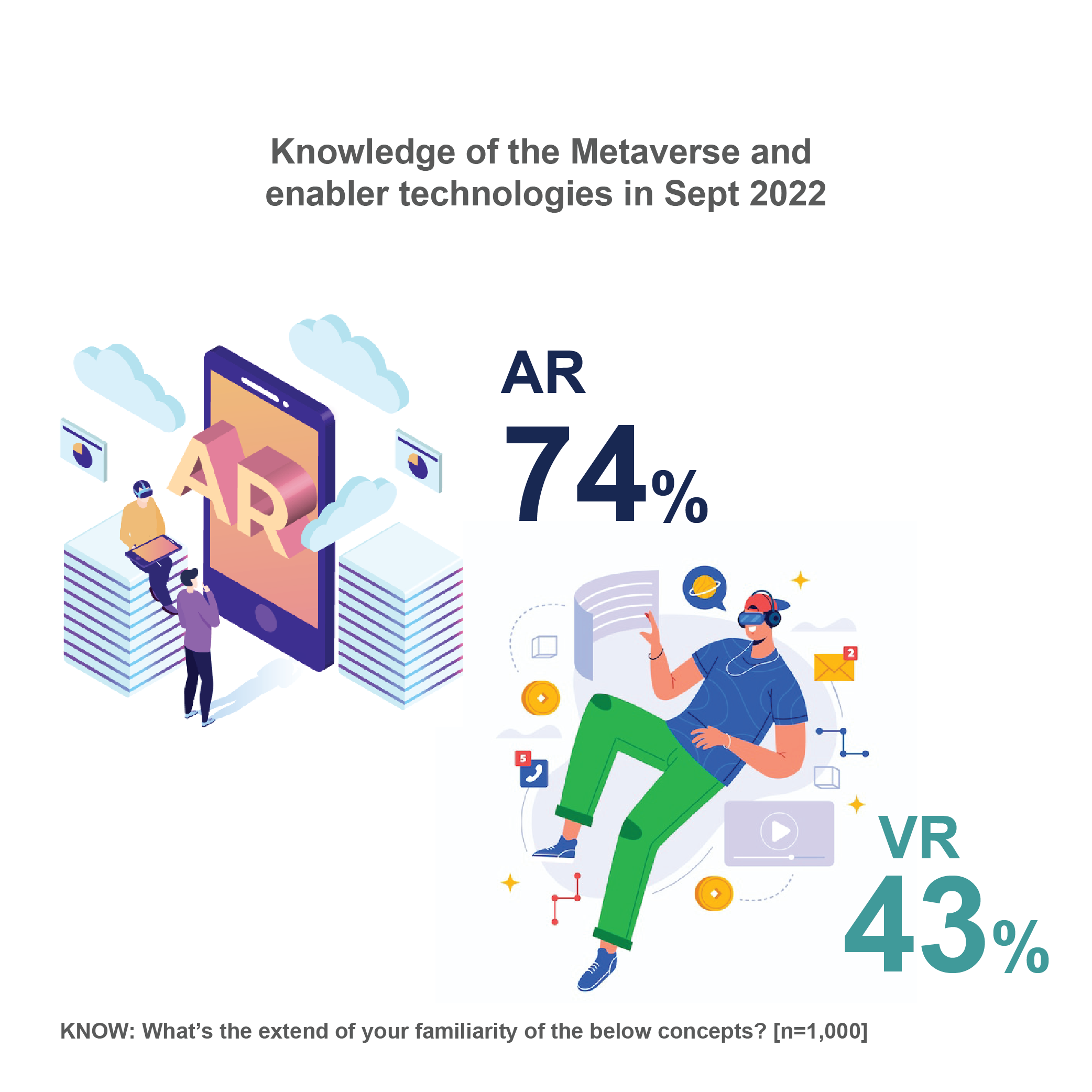
Virtual reality (VR) and/or augmented reality (AR), in combination or individually, provide immersive mixed-reality experiences in the virtual and/or physical world.
However, while the knowledge of virtual reality is high (74% in Sept 2022), the knowledge of augmented reality is significantly lower (43% in Sept 2022). This could be because there is not a significant level of AR experiences or projects recently in HK. However, this could change with MR Metaverses like the Adventures in Reality (AiR) platform and the continued marketing of experiences by brands.
Many could describe the Metaverse, but some can only describe a pillar of the Metaverse
The Metaverse has been described in many ways. Although the self-claimed knowledge of the Metaverse is high,
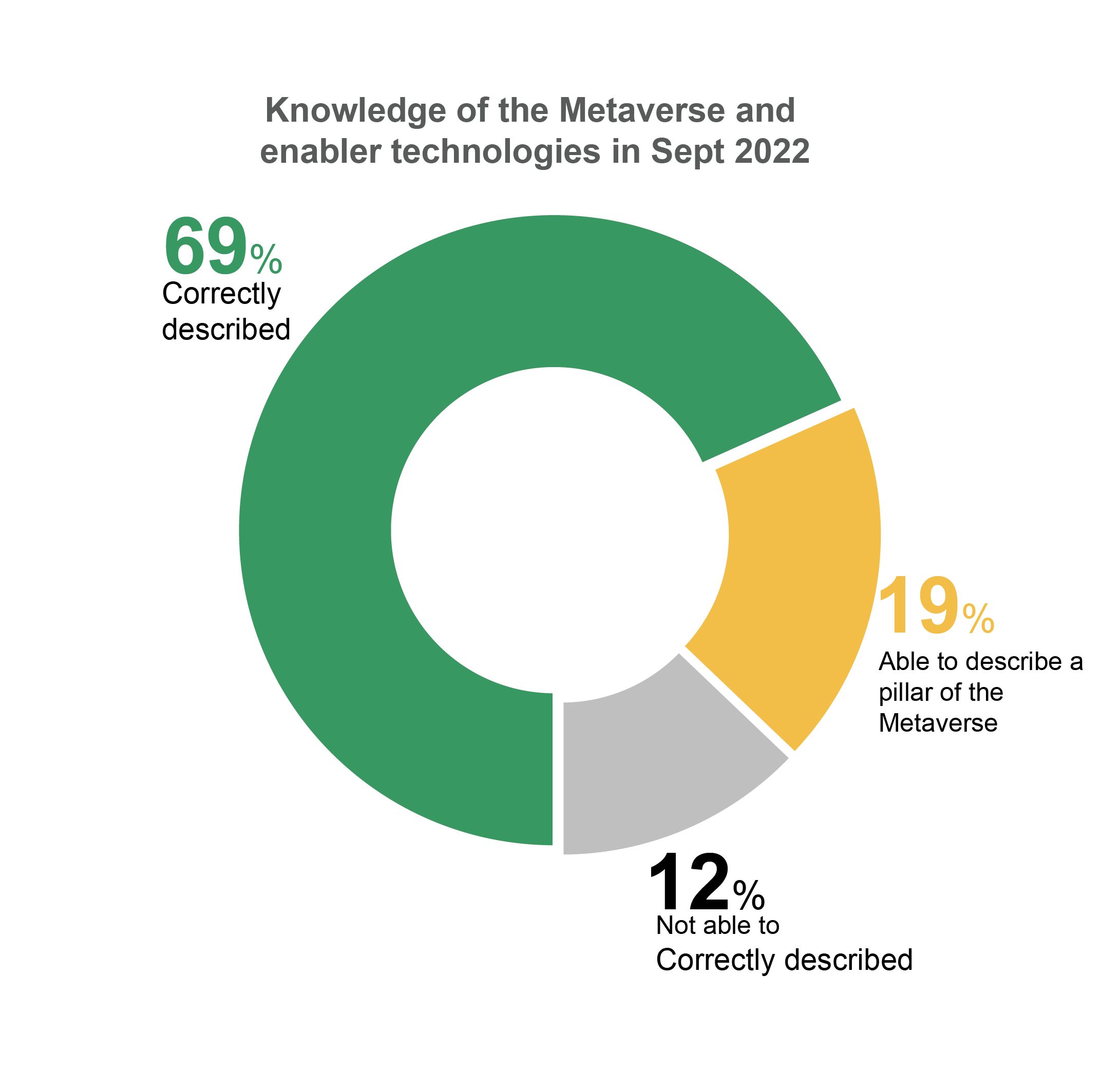
- About 69% of those who claimed to be familiar with the Metaverse can properly define the Metaverse as "a virtual, computer-generated world where people can socialise, work and play".
- About 19% of those who claimed to be familiar with the Metaverse can describe a pillar of the Metaverse (i.e. new internet experience, or buy/sell digital art/currency, or virtual reality shopping, or a new social networking platform)
This is not surprising, as the Metaverse is still in its very early infancy, and the functionalities of existing Metaverse platforms do not provide the whole suite of experiences covering all of the social, work and play aspects.
Despite high awareness and knowledge of the Metaverse in Hong Kong, Hong Kongers have not conducted many activities in the Metaverse. Around 60% of those aware of the Metaverse has conducted at least some activities in Metaverse. Amongst the activities, 38% of those who are aware of the Metaverse have played a game in the Metaverse, followed by watching a movie/concert (29%), meeting and socialising (28%), and learning (25%).
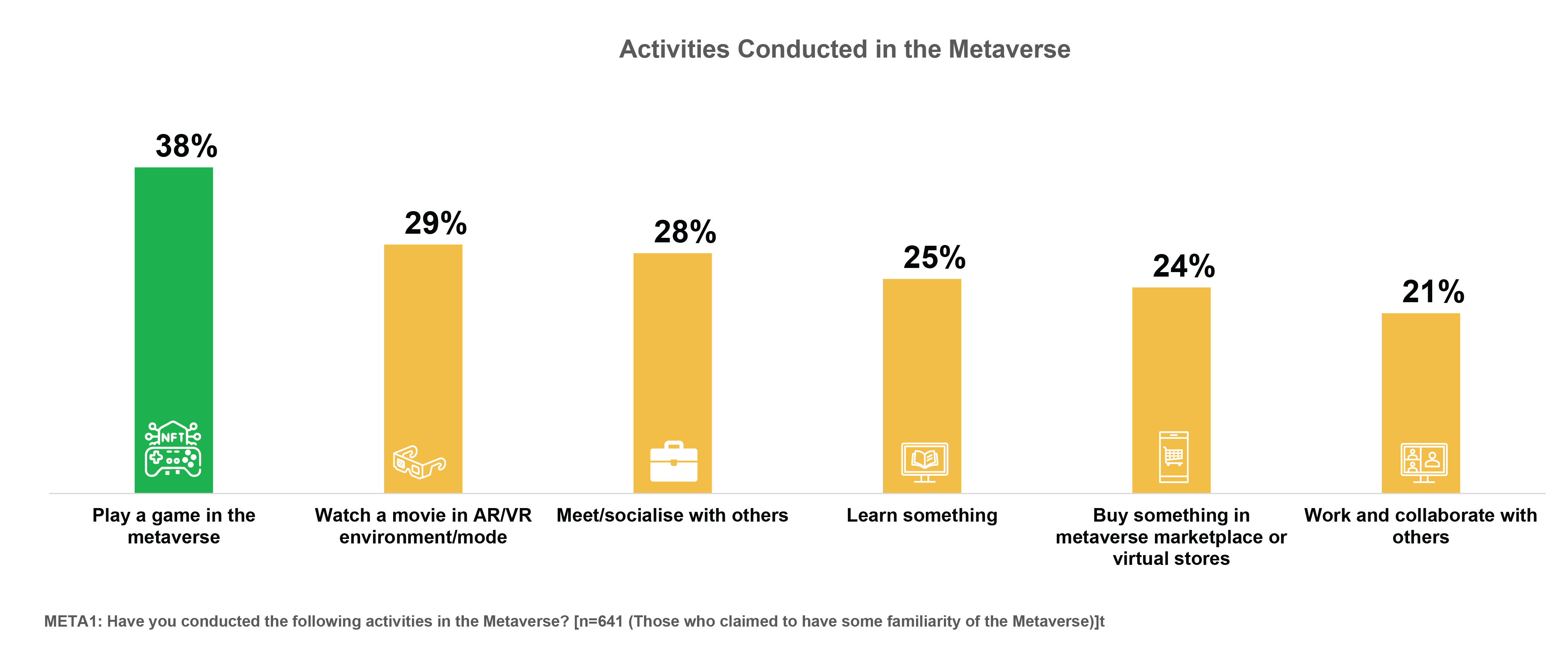
To a certain extent, gamification could be a good entry point for consumers to experience the Metaverse – especially given all of the recent VR/VR games.
Businesses should develop plans to address concerns while driving adoption.
Today, the Metaverse provides a form of anonymity and new degrees of freedom for the participants inside the semi/fully immersive environment. This newfound anonymity and freedom in also open opportunities for misconduct and other concerns currently existing over the traditional Internet.
Major concerns about the Metaverse centered:
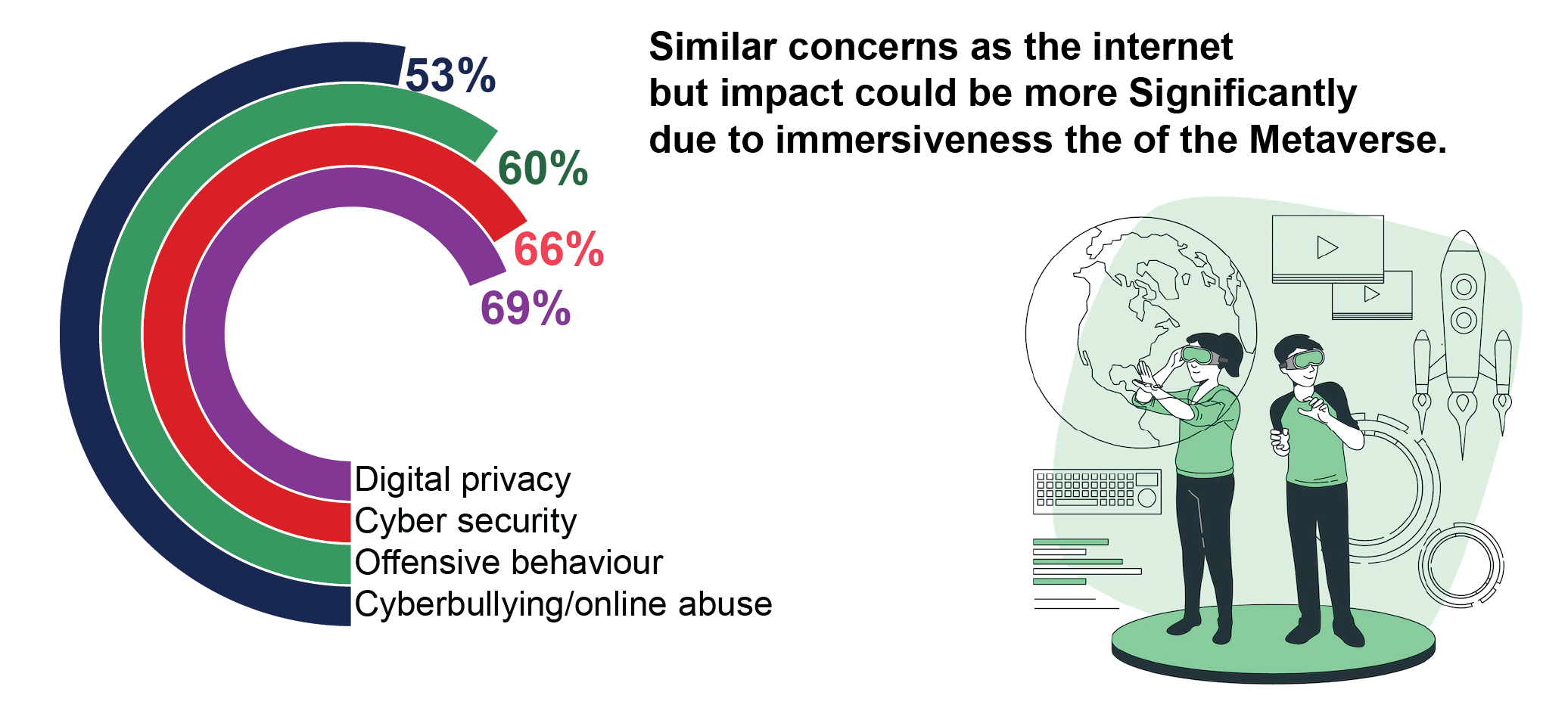
While these are not Metaverse-specific issues, the immersive nature of the Metaverse could cause significantly more emotional damage to the victims due to the immersion of the environment.
Businesses should also be aware that the nature of the Metaverse could be semi/fully open environments, making enforcement difficult. Regardless, businesses should adapt and enhance their current customer-centric cybersecurity, privacy, and related Internet policies for the Metaverse. More importantly, they should be cognizant of the possibility of the proliferation of potential offensive and criminal behaviour by other participants in the open Metaverse platforms and put action plans and policies to manage these potential situations.
The METAVERSE PLATFORMS
Awareness of the Metaverse platforms varies greatly
Many different Metaverse platforms are available today, many offering a wide ranging capbailties and focusing on a limited aspects of the Metaverse; some even provide experiences specific to Hong Kongers. In general, the awareness of some of the major platforms ranges from 5% to 31 %.
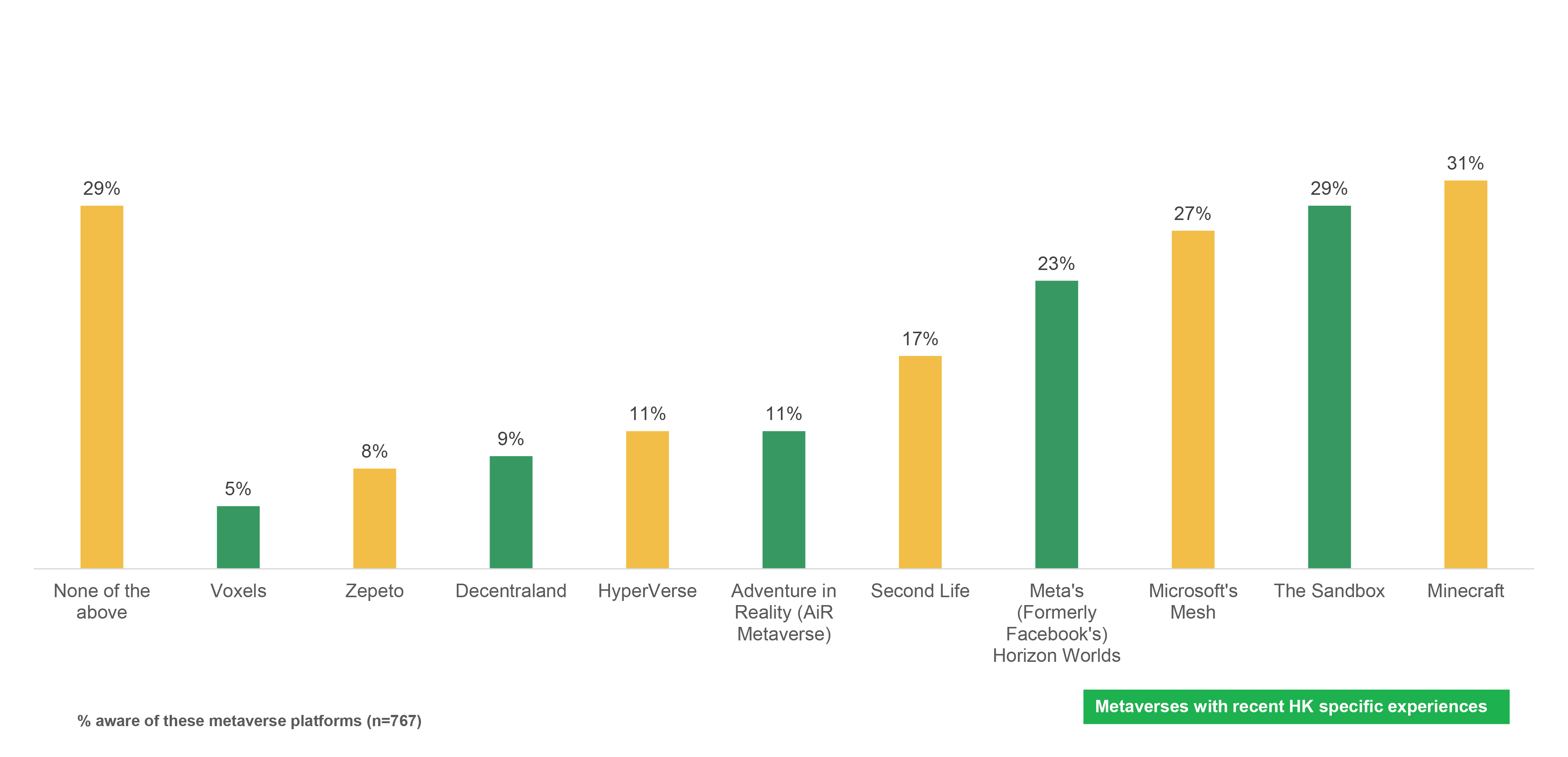
A handful of these platforms have relevant Hong Kong experiences and/or local brands marketing their involvements that Hong Kongers could visit. Among these platforms,
-
The Sandbox, a voxel-based Metaverse platform, has about 21% of the respondents who are aware of these Metaverse platforms that have visited.
-
Adventures in Reality (AiR), a Hong Kong-based augmented reality platform, about 9% of the respondents who are aware of these Metaverse platforms have visited.
-
Decentraland, with 6% of those who are aware of these Metaverse platforms have visited
-
Voxels, another voxel-based Metaverse platform, has only about 4% of the respondents who have visited the platform.
Many local brands have launched experiences in the Metaverse. In general, about 15% of the respondents who are aware of local brands' activities in the Metaverse.

Other brands we asked about included Meta, Samsung, MTR, PCCW/HKT, SCB, Time Square, Hang Seng Bank, Time Square, Regal Hotel Group, …With brands launching localized experiences, some of the more prevalent Hong Kong focused Metaverse experiences include the following:
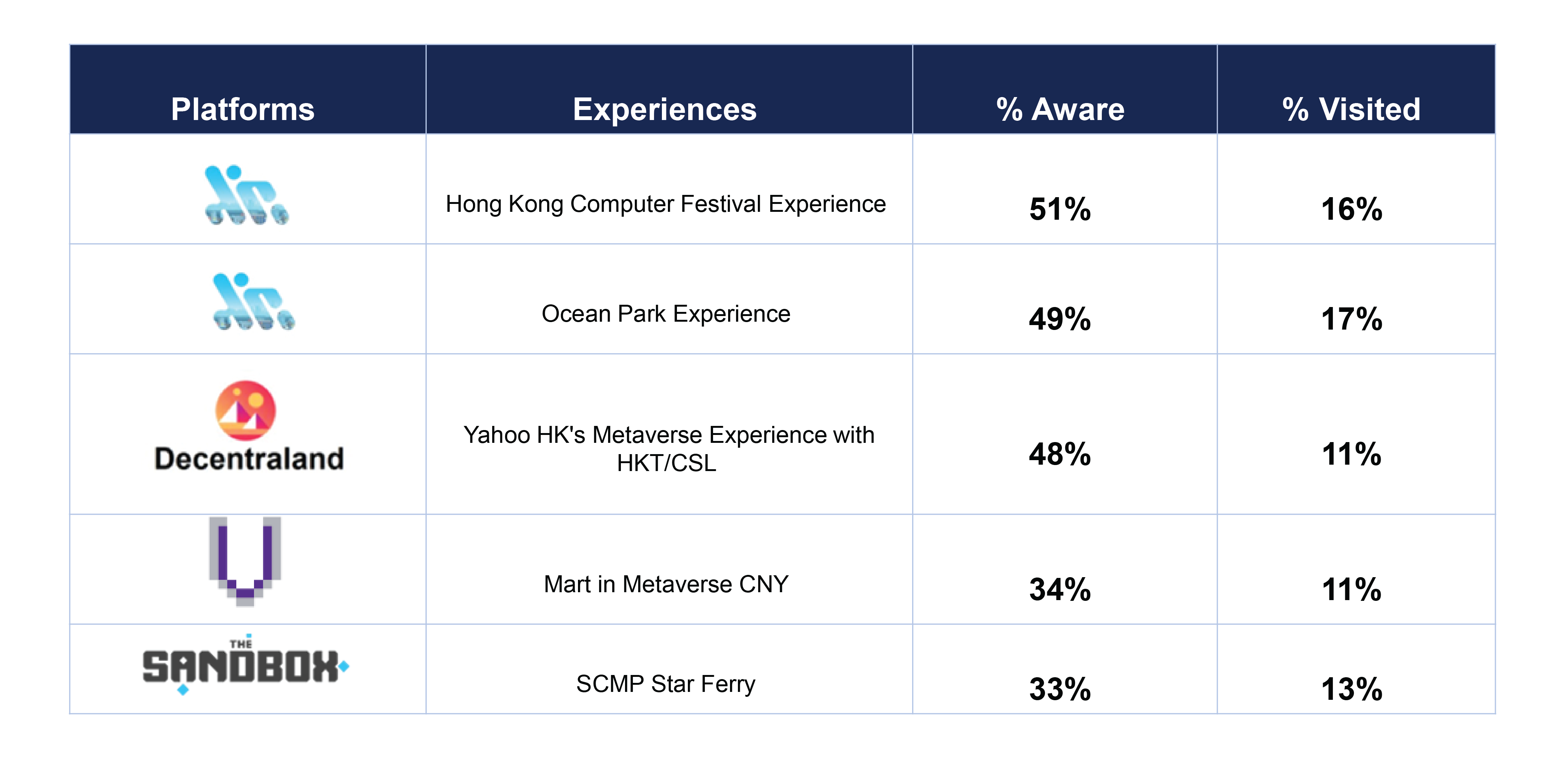
It is worth noting that while the awareness of these experiences is high among the Hong Kong respondents, only a much smaller portion of the respondents has actually visited these experiences – possibly due to technical frictions in accessing them.
Today, many brands leverage the Metaverse as another channel of engagement. The ultimate question is how consumers want to be engaged in the Metaverse. While experimentation could test the acceptability of local market audiences, our research points to gaming, entertainment, and seeking information/support as the preferred way for engagement. Businesses need to remember that:
- Metaverse is fragmented, and businesses need to consider the right Metaverse platform in providing an experience aligning with their Metaverse strategy
- They also need to choose a platform that balances awareness, minimizing frictions in accessibility and the ability to target the right audiences they want to engage
Stay tuned next week for our survey output on Metaverse-related assets in Hong Kong. If you are interested to learn more about the state of awareness, engagement and preferences of the Metaverse in Hong Kong, or more details on the survey results, please contact us.
About this study
1000 online interviews were conducted between September 9-16, 2022 among adults aged 18-64 Hong Kong general population.
REFERENCES: 1 https://en.wikipedia.org/wiki/Metaverse 2 http://km.cx/projects/hyper-reality
Related article: https://www.ipsos.com/en-hk/metaverse-perception-hong-kong



